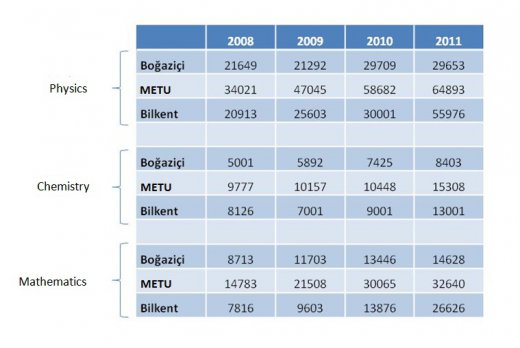What do basic sciences imply for Turkey’s 2023 targets?
As Turkey retires from basic sciences, it becomes more difficult to achieve the 2023 targets. The results of the national university placement examinations lately have been pointing at a decreasing interest in physics, chemistry and mathematics programs of universities. From this point of view, it seems that it will not be as simple as expected to overcome the mediocrity of Turkey’s production structure.
Over the last three decades, the Turkish economy has accomplished a rather fast shift from the agriculture to industry. The shares in exports of low-technology product groups as textile and readymade clothing and of medium-technology groups as automotive and electronics have reached as high as 80 percent. Meanwhile, GDP per capita increased from $1,500 in 1980 to $10,500 in 2011. Turkey targets to achieve $25,000 by 2023. To accomplish this, Turkey has to comprehensively transform its industrial sector, raising the value added in production and replacing medium-tech products with high-tech products. Achieving the targets for the year 2023 does not seem to be a realistic option unless Turkey upgrades it production structure to one compatible with those of the top-ten economies including Germany, the UK and France.
Advancing in basic sciences is the key to a more earthly strategy to achieve the 2023 targets, for three reasons.
- First, even though you can improve the GDP per capita from $1,500 to $10,500 just by importing existing technologies, you need to be original in order to jump to $25,000. And basic sciences are the key to originality. To become competitive in biotechnology, pharmaceuticals and machinery sectors dominated by the advanced economies on the top-ten list, Turkey has to give weight to basic research in these fields. South Korea that was able to make it from the group of middle-income to high-income countries, for instance, made a breakthrough in basic research. Most recently in August a group of Korean scientists developed a carbon battery that can charge electric cars 120 times faster than standard batteries[1].
- Second, indispensible products are discovered with the help of the advance in basic sciences. Take the invention of the automobile, for instance. If Dutch physicist Christian Huygens had not designed the internal combustive engine in 1680, German engineer Karl Benz could not have patented the first automobile almost two centuries later.
- Third, companies that carry the countries of their origin up to the top-ten conduct basic research in their R&D departments. The laser technology and transistor were invented in the AT&T’s research labs, for example. The scientists of the AT&T won 6 Nobel Prizes for their inventions under the auspices of the company. Developed countries conduct basic research to create economic value.
It seems that Turkey’s hardly-bright performance in basic sciences will further deteriorate in the period ahead. University exam ranking of students admitted to the basic sciences programs of Boğaziçi, Middle East Technical University (METU) and Bilkent University, three of the top universities of Turkey, worsened stably between 2008 and 2011 (Table 1). Average score ranking of students admitted to the METU physics program decreased from 34,000 in 2008 to 64,000 in 2011. The ranking of the Bilkent mathematics program decreased from 8,000 to 27,000. The decay in the average rankings of students admitted to the basic sciences programs was relatively limited in Boğaziçi University. Among the three disciplines, the ranking of chemistry students deteriorated the least for all of the three universities.
In US, the most advanced economy of the world, graduates of basic sciences programs work as scientists at global companies such as Apple, Microsoft and Intel, while their counterparts in Turkey have to settle with any job available. This evidently has to do with the demand dynamics in Turkey’s labor market. Annual average earning statistics for 815 occupations, released by the US Bureau of Labor Statistics are quite striking. Among 815 occupations, physicists rank 29th with an annual earning of $112,000, mathematicians rank 46th with $101,000, and chemists rank 142nd with $75,000. Seeing these figures, I couldn’t help wondering how much these occupations earn in Turkey. So, I checked the income statistics released by the Social Security Institution (SSI), but physicist, mathematician and chemist were not involved on the occupations list. The reason might be that professionals that work in these fields in Turkey can be counted on one hand. Even the fact that the SSI did not bother collecting this data is enough to show Turkey’s performance in basic sciences.
The Turkish private sector does not seem to have the vision to target at a breakthrough in basic sciences. Even the most successful companies try to keep going by following technologies developed by global sector leaders. They don’t aim to lead the sector but to maintain the market share, which sweeps away the incentive to invest in basic sciences. This is where the state has to step up. A good starting point could be to pay more attention to basic research at public research centers and to science faculties of universities. Cooperation with the private sector throughout the process is crucial. With the support of the public sector and the participation of the private sector, Turkey has to concentrate on basic research that will generate economic value. Otherwise, Turkey will have to postpone its 2023 targets to 2071.
Table: Average university exam ranking of students admitted to basic sciences programs

[1] http://inhabitat.com/south-korean-scientists-use-carbon-to-quick-charge-ev-batteries/




